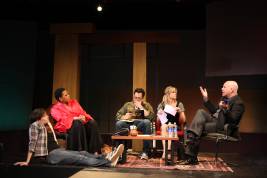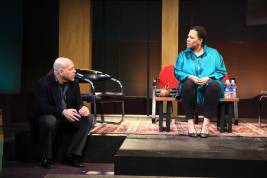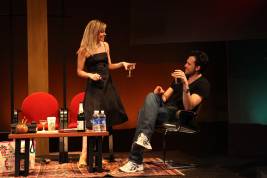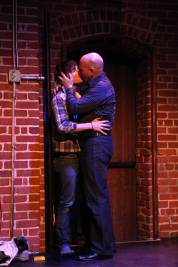
a•bove-the-line: (ə-bŭv’-THə-līn’) adj. the part of a film’s budget that covers the costs associated with major creative talent: the stars, the director, the producer(s) and the writer(s)
Ever wonder what happens in the high-rise Hollywood offices and private Beverly Hills bedrooms where movie deals are made? Well, wonder no more because playwright Susan Rubin takes you there in her hilariously biting new satire Above The Line, now getting a spiffy world premiere production at the Bootleg Theatre.
Meet the “above (and below)-the-line” cast of characters:
Angela King (Denise Dowse)—high-powered Vice President of Development at Supreme Studios
Jeremy Fisher (Jason Stuart)—movie producer, whose mother is the greatest female movie star alive today
Lucy Adams (Heather Marie Marsden)—beautiful young blonde descendent of the Adams family of America’s Founding Fathers fame
John Randazzo (Nick Mennell)—hot young screenwriter, who achieved fame with his indie hit Complexities (“My finest film, before I sold my soul.”)
Christian Tobias (Stewart W. Calhoun)—aspiring young movie songwriter with a taste for older men
As the lights go up, Lucy has approached Jeremy with a property, the journal of her great-great-great-great-great-great-great uncle, one of the Boston Adamses (and kinfolk of John and Samuel Adams). Jeremy: “Samuel Adams?? Oh, like the beer!!” Isaac’s journal turns out to be an honest-to-goodness first-hand account of the Boston Tea Party. Jeremy: “Indians? I had no idea that Indians did this!” When Lucy explains that it was in fact the white colonists whodressed up like Indians, Jeremy sees a hit. Three A-list actors stripped down to their loincloths! What could be better? “I can’t believe all this shit went down and no one knows about it! You gotta tell me this whole crazy story about the Tea Party!”
Meanwhile, over at Supreme Studios, where Angela and Christian are awaiting Jeremy and Lucy’s arrival, the exec warns the songwriter not to mention the word “musical” right away. After all, it doesn’t really matter what Lucy thinksshe wants. What she’ll end up getting will be what they want. Like Jeremy, Angela knew nothing about the Boston Tea Party until Googling it last night. “I’m not a history person. I’m a now person.” As for reading the journal, she has no plans to do so in the foreseeable future. “I’m an intuitive.” Once screenwriter John has arrived, Lucy goes into her rundown of the film’s plot, using illustrated flash cards and a first-grader’s vocabulary to astound them all with her Tea Party tale.
Heads pop up when Lucy reveals a pair of American History tidbits: Isaac Adams died of syphilis and John Hancock had a slave woman as a lover. John: “A white-black thing!!” Angela: “But I’m not seeing a story yet.” Fortunately, Lucy’s brought along copies for everyone. Angela: “It’s very long.”
In no time at all, plans for Tea (that’s what they’re calling the movie) are underway and so are a pair of romances. Hot young thing Christian makes a coffee date with Jeremy. Jeremy: “Buzz me when you get there.” Christian: “All right, I’ll buzz you.” Meanwhile, at John’s Silverlake apartment over on the bad side of La Brea, Lucy apologizes to John for her great-great-great-great-great-great-great uncle—with a kiss, and before you can say “American Revolution,” clothes are being ripped off. Jeremy and Christian move at a somewhat slower but no less deliberate pace. Christian: “I feel like a boy. You feel like a man. You’re not just any powerful man. You’re special. You have some pizza on your face.” Soon enough, Hungry Boy starts kissing pizza off of Powerful Man’s face.
By the time the first act of Above The Line comes to a close, everybody is after control of the movie, back-room deals are being made left and right, and the future of Tea The Movie Musical is anyone’s guess.
Rubin’s tasty script has an insider’s feel and a devilish sense of humor. When songwriter Christian debuts his rewrite of “White Man Red,” Angela blows a gasket. She wanted Adam Lambert and Christian is giving her Susan Boyle! “The song is for gummers! They eat their food slowly. And they don’t go to movies!” When Jeremy learns that an African American character in the story dies, he’s ecstatic. “A black ghost! We could get a rapper!” Lucy’s disdain for John’s first draft is intense. “This is a Mel Gibson movie!”
Mark Bringelson directs Above The Line with the same flair he showed in his crackerjack work on Rubin’s previous comedy Bitch, as well as a pair of superb Road Theatre productions, Bunbury and The Friendly Hour. He keeps the action moving fast and furious, Victoria Profitt’s snazzy multi-location set allowing lickety-split movie-like dissolves and jump cuts from scene to scene.
Performances are spot-on. Dowse is a delectably dry and deliciously imperious studio exec. Stuart does terrific work as a man attempting to balance a movie deal and a March-August romance all the while attempting to emerge from under his mother’s shadow. Marsden is girl-next-door perfection as a naïve young thing who may not be quite as innocent as she appears. Calhoun radiates charisma and shows off first-rate physical comedy chops, whether finding new ways to slouch sideways on an office chair or rolling up in a ball on the floor (following the Susan Boyle comment). 6’5” Mannell once again proves himself a star in the making with his dynamic work as a screenwriter who’s gone over to the Hollywood dark side.
Profitt’s ingenious set fits all of Above The Line’s many scene locales into the Bootleg’s fortunately wide, deep stage area, all the while looking like a million bucks. Jeremy Pivnick’s lighting is his usual brilliant best, translating those movie dissolves and jump-cuts into stage terms. Robert Prior’s costumes could not be better chosen to fit each character’s personality and style. John Zalewski’s sound design, too, couldn’t be better, with a particularly fine (and often dryly ironic) choice of background tunes. Michael J. Beahm serves as production stage manager.
A standout design/concept element is Adam Soch’s cinematography. Yes, cinematography! The play opens with spy cams (projected on a large screen above the set) showing Lucy’s arrival at Supreme Studios, moving from foyer to hallway to office before entering live on stage in the same outfit. Act Two opens with a scene between Jeremy and Christian (and Jeremy’s mother’s back) which takes place entirely on pre-shot high-def video, an inspired choice for a play about the movies.
A recent column by Steven Leigh Morris in the LA Weekly bemoaned the conspicuous lack of plays about Hollywood in Hollywood. Rubin’s Above The Line certainly helps to fill this gap. I loved every fly-on-the-Hollywood-wall moment of it.
Bootleg Theatre, 2220 Beverly Blvd., Los Angeles.
www.abovethelinetheplay.com
–Steven Stanley
March 20, 2010
Photos: Piper Ferguson






 Since 2007, Steven Stanley's StageSceneLA.com has spotlighted the best in Southern California theater via reviews, interviews, and its annual StageSceneLA Scenies.
Since 2007, Steven Stanley's StageSceneLA.com has spotlighted the best in Southern California theater via reviews, interviews, and its annual StageSceneLA Scenies.







 COPYRIGHT 2024 STEVEN STANLEY :: DESIGN BY
COPYRIGHT 2024 STEVEN STANLEY :: DESIGN BY